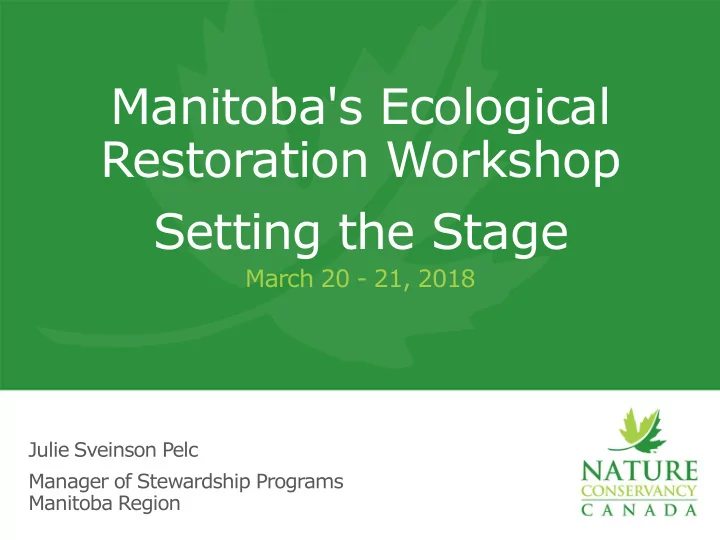

Manitoba's Ecological Restoration Workshop Setting the Stage March 20 - 21, 2018 Julie Sveinson Pelc Manager of Stewardship Programs Manitoba Region
Welcome • Opportunity to share and strategize on how to enable restoration in Manitoba • Guide restoration practices into the future • Bring together land managers, practitioners, local industries, conservation groups, multiple levels of government, consultants and researchers
Background How have we gotten to where we are now? • Saskatchewan Prairie Conservation Action Plan Native Prairie Restoration / Reclamation Workshop. (Feb 2011 - present) • Prairie Conservation and Endangered Species Conferences • Manitoba Prairie restoration group informally met in 2016 • Discussions between restoration folks and interest groups • November 2017 initial planning meeting
Planning meeting, Nov 2017 Conservation Organizations (2) • Manitoba Habitat Heritage Corporation and Nature Conservancy of Canada Manitoba Region Environmental Services & Seed companies (4) • Miller Environmental, Prairie Habitats Inc., Prairie Originals, and Scatliff Miller Murray Government (6) • Agriculture Canada, City of Winnipeg-Naturalist Services Branch, Manitoba Agriculture, Manitoba Infrastructure, Manitoba Parks and Protected Areas, and Parks Canada-Riding Mountain National Park Museums & Universities (5) • Living Prairie Museum, Manitoba Museum, North Dakota State University, University of Manitoba, and University of Winnipeg
Question Responses • Questions were circulated to 18 participants for response to guide the planning meeting Email, 8, None, 9, 44% 50% Voice Message, 1, 6%
Summary of responses: Benefits of restoration • Conservation/enhancement of biodiversity • Habitat creation/protection • Improved ecological goods and services • Social benefits • Long-term cost savings
Summary of responses: Restoration successes in MB • East side road (Lake Winnipeg) • City of Winnipeg projects: riparian, Assiniboine forest • DUC revegetation • Riding Mountain National Park: fire and exotics control • Selkirk library (Conservation District) • Land management techniques: grazing systems • Residential developments with native grass plantings • Prairie gardens (Forks, Living Prairie Museum) • Monarch restoration at T all Grass Preserve • Manitoba Infrastructure roadside work • Wetland construction (NCC and others)
Summary of responses: Barriers to restoration • Common understanding of types of restoration • No clear picture of present status of restoration • Policies, procedures, standards and guidelines • Lack of local eco-type seed • Need for resources and support • Sharing knowledge • Limited funding for restoration ecology research • No clear baseline for reference communities • Undefined methods for evaluation and follow up • Impacts of climate change
Summary of responses: Opportunities • Chance to build on recent successes and use existing expertise • Opportunity to reflect on and define measures of restoration and success • Location and project opportunities • Opportunity for local seed production • Chance to influence policy • Chance to capitalize on increase in interest
Vision for restoration in MB Restoration activities become an important component of the health and persistence of the biodiversity and ecological functioning of the prairies and parklands in Manitoba, and these activities are supported by clear standards, by sufficient resources, capacity and economic viability, and by ongoing knowledge creation and transfer .
Workshop topics • Current status of ecological restoration in Manitoba • Local native seed sourcing and pollinators • Economics of seed production • Current restoration research
Workshop objectives: 1. Bring people together to share knowledge and expertise 2. Build momentum towards establishing a Manitoba Ecological Restoration Network 3. Identify models for polices and seed production from other regions and consider ways to adapt them to Manitoba 4. Explore best restoration practices that facilitate rare habitat and species at risk conservation 5. Identify approaches to long-term restoration 6. Produce a guiding report for next steps to improve restoration capacity in Manitoba
Restoration Definitions • Society for Ecological Restoration definitions (2004) • Ecological restoration: process of assisting the recovery of an ecosystem that has been degraded, damaged, or destroyed • Rehabilitation: reparation of ecosystem processes, productivity and services. May or may not encompass re- establishment of pre-existing species composition and community structure • Reclamation: Return of land to safe, aesthetically pleasing and/or useful state • Revegetation: establishment of plants in disturbed site • Mitigation: action intended to compensate environmental damage
Happy chatting!
Recommend
More recommend